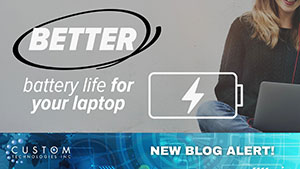
When was the last time you wrapped up a busy workday and still had plenty of battery left on your laptop?
For most business owners, that sounds like wishful thinking. Between meetings, client calls, and constant multitasking, your laptop’s battery can drain faster than your morning coffee.
Microsoft recognizes this challenge—and they’re testing a smart new feature in Windows 11 designed to help your laptop last significantly longer. It’s called Adaptive Energy Saver, and it could be a real game-changer for productivity and mobility.
What Is Adaptive Energy Saver?
Traditionally, Windows activates its energy-saving mode only when your battery is running low. You can adjust those settings manually—but that’s not always convenient or efficient.
Adaptive Energy Saver changes that. Instead of waiting until your laptop’s battery dips below a certain percentage, this feature intelligently monitors your activity.
When you’re performing light tasks—like browsing the web, checking email, or working in Word—it automatically activates energy-saving measures in the background, even while you’re plugged in.
And here’s the best part: it doesn’t mess with your screen brightness or performance. Instead, it subtly optimizes your laptop’s processor and graphics usage—two of the biggest power consumers—so you can keep working longer without worrying about finding an outlet.
How Does This Help Metro Atlanta Businesses?
For business owners and professionals across Metro Atlanta, especially those who are constantly on the go, this update could make a noticeable difference:
- More productivity between charges – Work through client meetings, site visits, or remote sessions without interruptions.
- Reduced wear and tear – Fewer charge cycles mean your laptop’s battery could last longer overall.
- Improved employee efficiency – Less downtime searching for a charger means more focus on business priorities.
In today’s fast-paced business environment, small efficiency gains like this can add up to major productivity wins.
When Can You Expect It?
The Adaptive Energy Saver feature is currently being tested in Microsoft’s Canary Channel, an early-access version of Windows where new tools are evaluated before general release.
While not every test feature makes it to production, this one seems like a no-brainer—especially for organizations that rely on mobile productivity and remote work flexibility.
The Bottom Line
As technology continues to evolve, even small updates like this one can have a big impact on how your team works. If Microsoft rolls out Adaptive Energy Saver to all users, your Windows 11 laptops could feel like they’ve had a major upgrade—without you having to buy a thing.
If your devices are due for an upgrade—or if you’d like to make sure your technology is optimized for performance and efficiency—Custom Technologies, Inc. can help.
Let’s make your IT work smarter, not harder.
Let us manage your network so you can manage your business.
FAQs: Adaptive Energy Saver and Windows 11 for Business
- What does Adaptive Energy Saver actually do?
It automatically optimizes your laptop’s performance and power usage based on the tasks you’re performing—helping you get more battery life without manual adjustments. - Will Adaptive Energy Saver slow down my laptop?
No, it’s designed to reduce power use only when performing light tasks. You’ll still have full performance for demanding applications like video editing or data analysis. - How do I enable Adaptive Energy Saver?
Once available, you’ll be able to turn it on in your Windows 11 Settings > Power & Battery menu. Microsoft is currently testing it in the Canary Channel. - Can this feature help extend the lifespan of my laptop?
Yes! By reducing the number of charge cycles and optimizing power use, it can help maintain your battery’s health over time. - How can my business make the most of features like this?
Work with an IT Managed Service Provider (MSP) like Custom Technologies, Inc. to ensure your devices are configured for maximum performance, security, and longevity.



